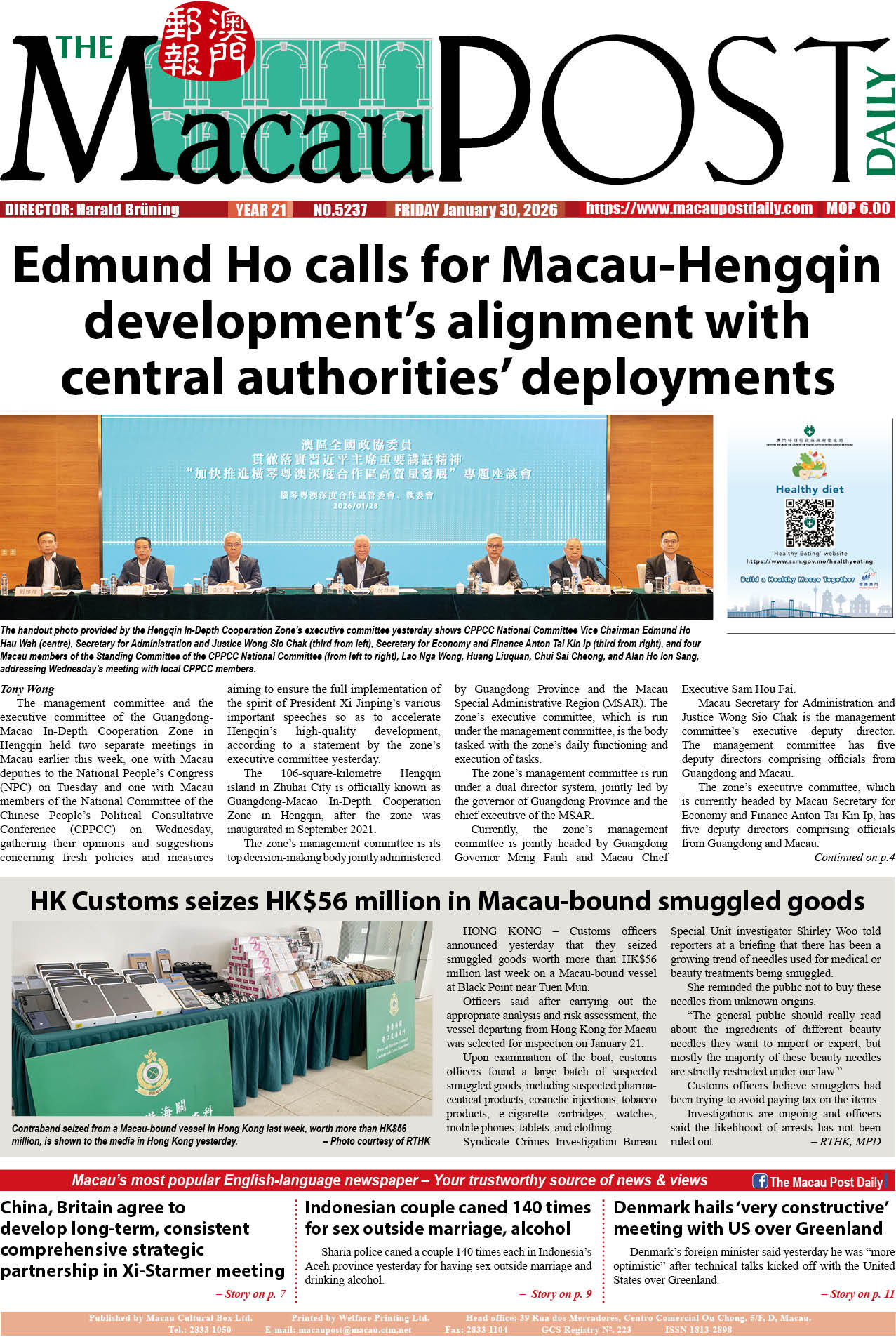The University of Macau (UM) said in a statement on Monday that its COVID-19 research team has analysed the pandemic prevention process in Macau’s latest situation, stressing that the relaxation of regulations is “a necessary step to help the local community return to normality”.
According to the statement, Macau has adhered to the zero-COVID policy for three years and has been protected against the original COVID-19 strain and its Delta variant, and gained the time needed to “prepare for the inevitable impact” after the relaxation of regulations.
The statement noted that the city’s pandemic prevention guidelines are continuously being optimised during the current transition period in line with the mainland’s epidemic prevention policy’s development, while the importance of all sectors of the community to gain a good understanding of the virus, good personal hygiene practices and treatment experience, among others, have also been emphasised by the authorities.
The statement added that before the infection peak, cases “will certainly surge”, while a “significant increase” in recorded cases and hospital occupancy rates copuld be expected. Based on the experiences of the majority of Omicron variant infectees, post-infection discomforts including fever, pain, and cough “can be treated effectively with the right medications”. Patients also usually recover within five to seven days, the statement noted.
The statement added that during home isolation, infectees should take personal precautions, maintain good home hygiene and avoid unprotected contact with family members. Until fully recovered, they should also stay at home, avoid meal gatherings, wear appropriate facemasks when going out and avoid using public transport.
The expected increase in recovered cases, the statement said, would help ease infection concerns and build confidence among the public. Meanwhile, the statement underlined, the available data shows that those with underlying medical conditions, senior citizens and the unvaccinated are more likely to develop more severe symptoms including shortness of breath, palpitations and chest pain upon being infected with the Omicron variant.
The increase in cases has placed a “heavy burden” on the healthcare system, the statement acknowledged. The setting-up of outpatient clinics for COVID-19 patients with mild symptoms seeking medical advice has been able to provide more emergency and inpatient services for patients with more acute illnesses, the statement said.
The statement added that the government should enhance efforts to promote the clinics’ use and increase their service capacity, as well as raise the number of clinics depending on the changing needs.
The symptom-based triage measures and the appointment workflow should be continuously reviewed and optimised, while public-private partnerships (PPPs) with private healthcare facilities and the city’s community pharmacy network should be leveraged to enable those with mild symptoms to easily seek medical treatment and obtain medicine.
The team also looked at Singapore’s experience from its latest outbreak, noting that the virus is constantly mutating, with the latest variant in Singapore being Omicron XBB.1, but that wave has been shorter than the previous waves caused by other strains; The number of hospitalised patients, mainly those aged 70 and up, increased significantly, the statement underlined.
Still looking at Singapore’s experience, the statement said that those with a previous Omicron infection were less likely to test positive in the wave caused by Omicron XBB.1 than those without a history of infection; and hybrid immunity (immunity provided by a combination of infection and vaccination),was “more effective in reducing the number of hospitalised patients and deaths per capita”.
Many countries are also currently facing a fourth wave of Omicron cases, meaning that “reinfection is possible” and that reinfection risk with a new COVID-19 variant cannot be eliminated, the statement warned.
The research team noted that COVID-19 infection may continue to affect people’s lives in the future, but its impact was expected to gradually weaken. Continuously improving effective cross-sector measures, particularly in care and triage services for seniors in the high-risk group, was important to maintain Macau’s normal operation, the statement noted.
The statement added that the public should maintain good prevention measures, use medical resources wisely, and get vaccinated, especially the elderly, for better protection even if they have already been infected. Wearing a facemask properly and maintaining personal hygiene also remain essential, the statement urged the public.
Caption: Undated file photo of University of Macau (UM) campus on Hengqin island. - Photo courtesy of UM









